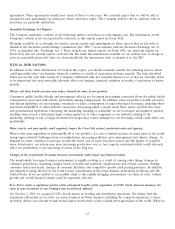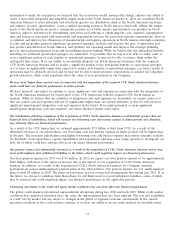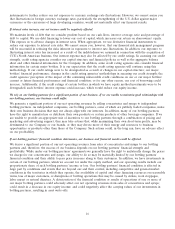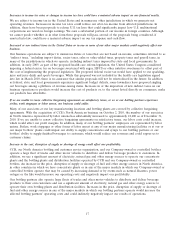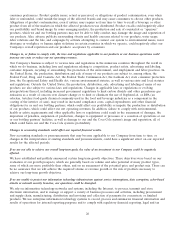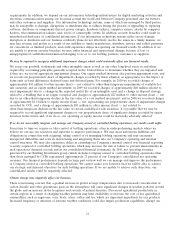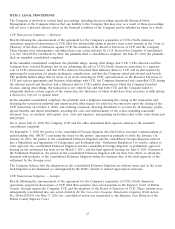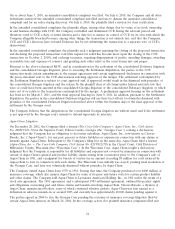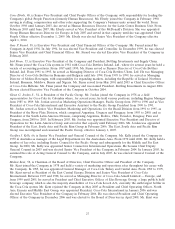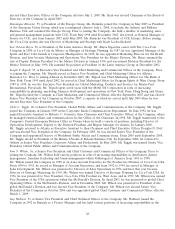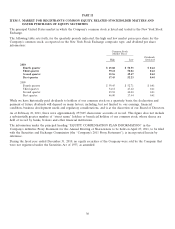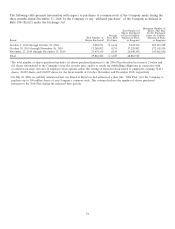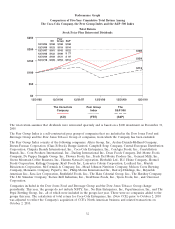Coca Cola 2010 Annual Report Download - page 24
Download and view the complete annual report
Please find page 24 of the 2010 Coca Cola annual report below. You can navigate through the pages in the report by either clicking on the pages listed below, or by using the keyword search tool below to find specific information within the annual report.supply chain or impact demand for our products. Climate change may also exacerbate water scarcity and cause a further
deterioration of water quality in affected regions, which could limit water availability for our system’s bottling
operations. As a result, the effects of climate change could have a long-term adverse impact on our business and results
of operations.
Global or regional catastrophic events could impact our operations and financial results.
Because of our global presence and worldwide operations, our business can be affected by large-scale terrorist acts,
especially those directed against the United States or other major industrialized countries; the outbreak or escalation of
armed hostilities; major natural disasters; or widespread outbreaks of infectious diseases such as H1N1 influenza, avian
influenza or severe acute respiratory syndrome (generally known as SARS). Such events could impair our ability to
manage our business around the world, could disrupt our supply of raw materials, and could impact production,
transportation and delivery of concentrates, syrups and finished products. In addition, such events could cause
disruption of regional or global economic activity, which can affect consumers’ purchasing power in the affected areas
and, therefore, reduce demand for our products.
ITEM 1B. UNRESOLVED STAFF COMMENTS
Not applicable.
ITEM 2. PROPERTIES
Our worldwide headquarters is located on a 35-acre office complex in Atlanta, Georgia. The complex includes the
approximately 621,000 square foot headquarters building and an approximately 870,000 square foot building in which
CCNA’s and CCR’s main offices are located. The complex also includes several other buildings, including the
approximately 264,000 square foot Coca-Cola Plaza building, technical and engineering facilities, a learning center and a
reception center. We also own an office and retail building at 711 Fifth Avenue in New York, New York. These
properties are primarily included in the Corporate operating segment.
We own or lease additional facilities, real estate and office space throughout the world which we use for administrative,
manufacturing, processing, packaging, packing, storage, warehousing, distribution and retail operations. These properties
are generally included in the geographic operating segment in which they are located.
In North America, as of December 31, 2010, we owned 65 beverage production facilities, 10 principal beverage
concentrate and/or syrup manufacturing plants, one facility that manufactures juice concentrates for foodservice use and
four bottled water facilities; we leased one bottled water facility and one beverage production facility; and we operated
299 principal beverage distribution warehouses of which 112 are leased and the rest are owned. Also included in the
North America operating segment is a portion of the Atlanta office complex.
Additionally, as of December 31, 2010, our Company owned and operated 20 principal beverage concentrate
manufacturing plants outside of North America, of which four are included in the Eurasia and Africa operating
segment, three are included in the Europe operating segment, five are included in the Latin America operating
segment, and eight are included in the Pacific operating segment.
We own or hold a majority interest in or otherwise consolidate under applicable accounting rules bottling operations
that, as of December 31, 2010, owned 98 principal beverage bottling and canning plants located throughout the world.
These plants are included in the Bottling Investments operating segment.
Management believes that our Company’s facilities for the production of our products are suitable and adequate, that
they are being appropriately utilized in line with past experience, and that they have sufficient production capacity for
their present intended purposes. The extent of utilization of such facilities varies based upon seasonal demand for our
products. However, management believes that additional production can be obtained at the existing facilities by adding
personnel and capital equipment and, at some facilities, by adding shifts of personnel or expanding the facilities. We
continuously review our anticipated requirements for facilities and, on the basis of that review, may from time to time
acquire additional facilities and/or dispose of existing facilities.
22



